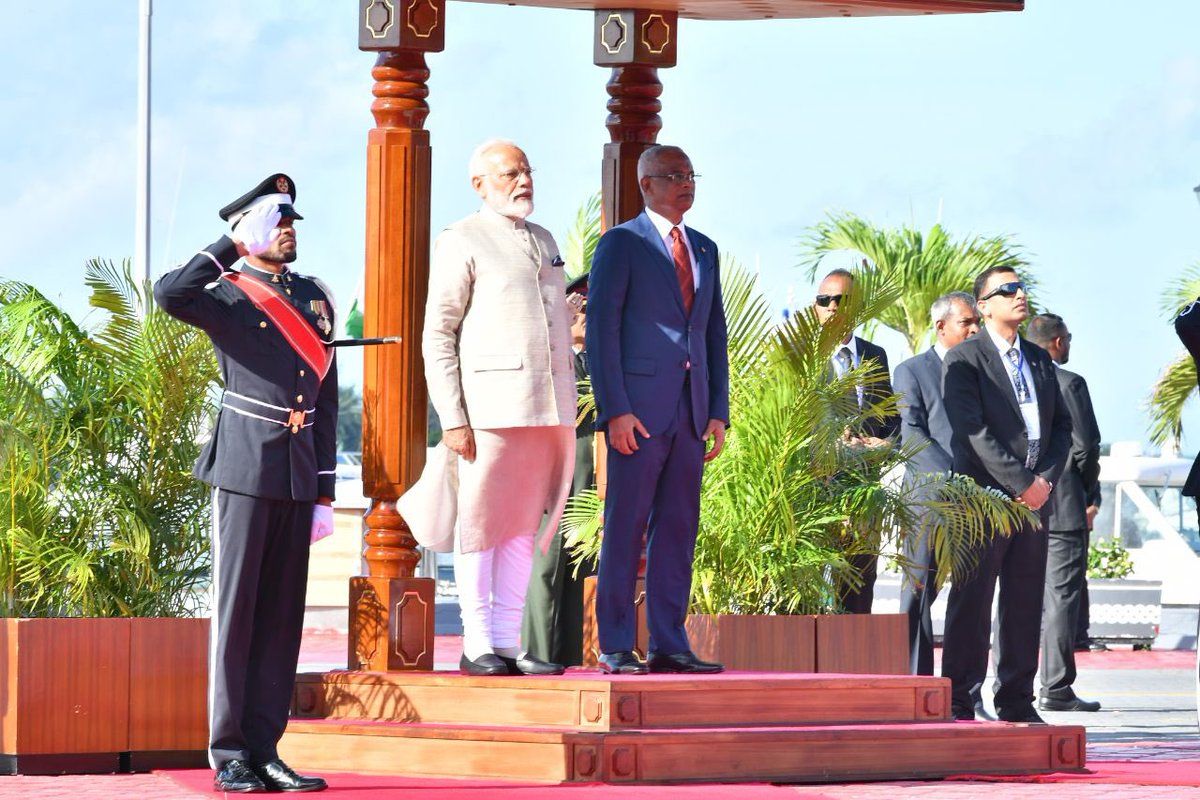Prime Minister Narendra Modi’s Colombo visit on June 8 couldn’t have been more timely as the neighbouring nation is still reeling from the aftershocks of the Easter Sunday terror attacks of April 21.
The visit, within almost a week of Mr Modi beginning his second innings, is seen as a wise move to provide succour (the PM also met the Catholic Christian local leadership and visited the St Anthony’s church to instil a sense of security) and bolster the comfort level of Sri Lanka in the aftermath of the terror strikes.
Advertisement
Also, an early visit to the island nation fulfils India’s favoured neighbourhood policy specially to a vibrant BIMSTEC partner, thus raising hopes of a renewed robust friendship between the two countries. Diplomatically, this visit is likely to dilute the misconception that Sri Lanka has gone under the influence of China whose expansionist designs around the Indian Ocean rim have lately been a matter of suspicion.
However, principally this visit can be described as timely because India now seems to be poised to play a proactive role in the neighbourhood to contain the rising trend of Islamic terror. Hence the focus of talks between Prime Minister Modi and his Sri Lankan counterpart, Ranil Wickremasinghe, was on ways and means to arrest this disturbing trend. Importantly, both sides pledged increased cooperation to counter terrorism.
Before his Colombo visit, the Prime Minister visited Maldives and deliberations were held to address terror concerns. It would, therefore, appear that India is poised to take a bold part as the leading nation in dealing with the terror menace threatening South Asia from ISIS. Countries in the immediate neighbourhood apprehending terrorist strikes include Bangladesh which saw ISIS-inspired bombings on April 30 and later on May 27 in Dhaka, mainly targeting the police.
According to a well known security analyst based in Dhaka, messages in English, Hindi and Bangla have surfaced, issued by a Muhammad al Bengali and currently under circulation. These warn of more terror attacks. Significantly, Muhammad al Bengali is believed to be the ISIS appointed “Emir” of Bangladesh.
Immediately before this development, Baghdadi, the chief of ISIS, earlier thought to have been killed, released a video carrying threats of terrorist acts to be perpetrated in Asia. This is more than a coincidence and it is now becoming increasingly clear that contrary to the earlier reports of ISIS collapse, this dreaded outfit is trying to reassert its primacy with India, Bangladesh and other South Asian countries as its potential targets. Bangladesh saw the last deadly terror attack on 1 July 2016.
A large number of youth were found to have been radicalised and some of them were involved in the infamous Holy Artesan bakery strike. It is suspected that preacher Zakir Naik was also responsible in sowing the seeds of terror discord in Bangladesh through his video messages and hate websites. Much has been written about Naik’s activities but he enjoys residency status in Malaysia, courtesy Dr Mahathir Mohamed, the country’s Prime Minister who refuses to extradite him to India where he is wanted for multiple offences.
As late as on June 11, Mahathir refused point-blank to concede to the Indian request. He cited the case of a Malaysian national, Sirul Azhar Umar, who murdered a Mongolian model in 2015, was awarded a death sentence and is cooling his heels in Australia which refuses to extradite him to Malaysia to avoid the death penalty.
Mahathir conveniently forgets that Malaysia was and is considered a friend of India. Also, the Indian judicial process is more fair than the prevailing system in Malaysia. Hence, Zakir is a fit case for extradition. While dwelling on the subject, it’s pertinent to point out that of late Zakir Naik has stepped up his belligerence towards India as noticed from his recent statements (June 9) and recorded interviews to a popular Indian news magazine.
His tenor and tone are aggressive and defiant and show that has been emboldened by Mahathir’s support. It is assessed by many security experts that ISIS may be conveniently appropriating Naik’s propaganda tirade by subtly endorsing his efforts to poison young minds. Meanwhile, in a disturbing yet related development, ISIS has claimed that it has set up a new branch in India called “Wilayah of Hind” signalling that it is still alive and kicking.
It further claims to have set up a new province in India in the aftermath of the killing of notorious terrorist Zakir Musa in an encounter in Kashmir. Rita Katz, Director of the SITE Intel group that tracks Islamic extremists has stated that such ISIS claims should not be dismissed. In sum therefore, India and especially the state of Jammu and Kashmir, Bangladesh, Pakistan, Afghanistan and Sri Lanka remain fraught with real-time threats from ISIS and its local collaborators.
India is poised to play a vital role given its anti-terror architecture to combat such threats by fine-tuning its intelligence collection and intensified cooperation with neighbouring countries facing similar challenges.
(The writer, a former IPS officer, is a security analyst. The views expressed are personal)











